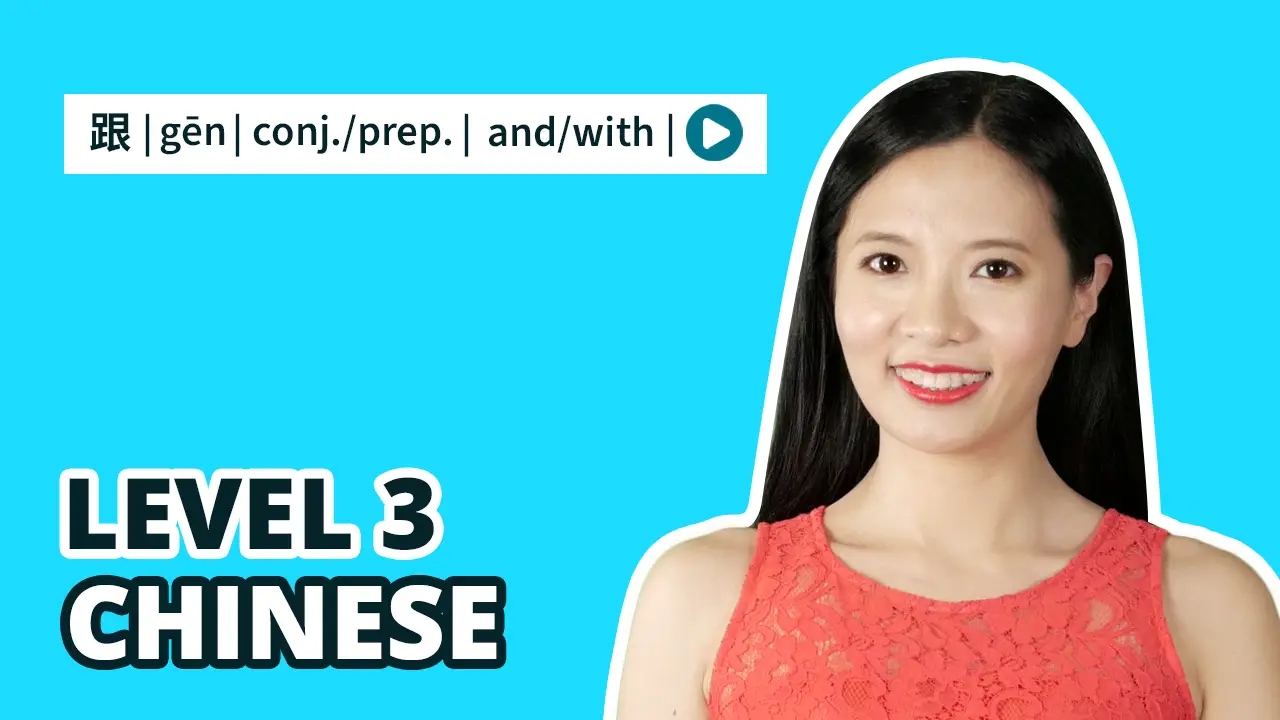Level 3 Lesson 7.1 – 难过 生气 相信 信 主要 父亲 母亲 父母 比如 比如说 例如
HSK 3+ VOCABULARY: 难过 生气 气 相信 信 主要 父亲 母亲 父母 比如 比如说 例如
In this video lesson we'll learn the vocabulary in Lesson 7 and practice them with a lot of example sentences. For new Chinese characters, we'll learn how to write them and know about their structures and origins in the attached writing sheet.
- VOCABULARY: 难过 生气 气 相信 信 主要 父亲 母亲 父母 比如 比如说 例如
- CHINESE CHARACTERS: 相 主 父 母 亲 如 例
VOCABULARY LIST
VOCABULARY USAGE
1. 难过 nánguò · HSK 3
adj. 形容词 xíngróngcí ▸ sad; feeling bad; feeling grieved; feeling sorry
- Lǎo Dài kū de tèbié nánguò.
老戴哭得特别难过。
Old Dai (was) crying very sad(ly). - Nǐ wèishénme zhème nánguò?
你为什么这么难过?
Why (are) you so sad? - Xiǎngdào shēngbìng de xiǎo gǒu, yéye yuè lái yuè nánguò le.
想到生病的小狗,爷爷越来越难过了。
Thinking about (the) little dog (that) got sick, grandpa (becomes) more and more sad.
2. 生气 shēngqì · HSK 3
(1) v. 动词 dòngcí ▸ to get angry; to get upset
- bié shēngqì
别生气
(do) not get angry; (do) not get upset - shēngqì le
生气了
to have gotten angry (already); to have gotten upset (already)
- Nǐ shēngqì gàn shénme? Zhè jiàn shì shì wǒ de cuò ma?
你生气干什么?这件事是我的错吗?
What (do) you get angry (for)? This “jian” (of) thing (-) is (it) my fault? - Jiù shì zhè zhǒng shì zuì ràng wǒ shēngqì.
就是这种事最让我生气。
(It) is exactly this kind (of) thing (that) makes me get angry the most.
(2) Detachable Compound 离合词 líhécí ▸ to get angry; to get upset
- shēng wǒ de qì
生我的气
to get angry (at) me - Nǐ zěnme yòu shēng tā de qì le?
你怎么又生他的气了?
How come you got angry (at) him again?
3. 气 qì · HSK 4
v. 动词 dòngcí ▸ [informal] to get angry; to get upset
- Nǐ zài qì shénme?
你在气什么?
What (are) you getting angry (for)? - Bié qì le, zǒu, wǒ qǐng nǐ chī dùn hǎo de!
别气了,走,我请你吃顿好的!
(Do) be angry (anymore), (let’s) go, I (will) invite you to eat (one) “dun” (of) good (stuff)! - Tīng le tā de huà, wǒ qì kū le.
听了他的话,我气哭了。
(After) listening to his words, I got-angry-(with the result of)-crying.
4. 相信 xiāngxìn · HSK 3
v. 动词 dòngcí ▸to believe; to believe in; to trust
- Háizi, wǒ hé nǐ māma dōu xiāngxìn nǐ!
孩子,我和你妈妈都相信你!
Child, me and your mom both trust/believe in you! - Nǐ yào xiāngxìn wǒ, wǒ bú huì zài ràng nǐ nánguò le.
你要相信我,我不会再让你难过了。
You need to trust/believe in me, I will not make you sad again (anymore).
- Suīrán wǒ bù xiāngxìn tā shuō de huà, dànshì nǐ shuō de, wǒ yě bù xiāngxìn.
虽然我不相信他说的话,但是你说的,我也不相信。
Though I (do) not believe (the) words (that) he said, but (the words that) you said, I also (do) not believe. - Wǒ xiāngxìn měi ge nǔlì de niánqīngrén dōu huì yǒu hěn hǎo de míngtiān.
我相信每个努力的年轻人都会有很好的明天。
I believe (that) every “ge” (of) hard-working young person all will have (a) very good tomorrow(/future).
5. 信 xìn · HSK 3
v. 动词 dòngcí ▸to believe; to believe in;
- Tā shuō de, nǐ xìn ma?
他说的,你信吗?
(What) he said, (do) you believe (it)? - Nǐ xìn bu xìn? Wǒ bāng nǐ zhǎodào xínglixiāng le!
你信不信?我帮你找到行李箱了!
(Do) you believe (it or) not believe? I helped you found (the) suitcase (already)! - Wǒ zhēn bú xìn nǐ zhème kuài néng shuìzháo.
我真不信你这么快能睡着。
I really (do) not believe (that) you can fall asleep this quickly.
6. 主要 zhǔyào · HSK 3
(1) adj. 形容词 xíngróngcí ▸ main; primary; chief; major; principal
- zhǔ yào wèntí
zhǔ yào de wèntí
主要问题
主要的问题
(the) main problem/question/issue - zhǔyào gōngzuò
zhǔyào de gōngzuò
主要工作
主要的工作
(the) main work/job/task
- Wǒ xué Hànyǔ de zhǔyào wèntí gēn nǐ yíyǎng, wǒ yě juéde Hànzì hěn nán.
我学汉语的主要问题跟你一样,我也觉得汉字很难。
(The) main problem (for) my learning Chinese (is) the same as you(rs), I too think (that) Chinese characters (are) very hard. - Gōngsī zhè ge yuè zuì zhǔyào de gōngzuò yǐjīng zuòwán le.
公司这个月最主要的工作已经做完了。
(The) most major work/task (of the) company this month (-) already (has been) done-(with the result of being)-finished.
(2) adv. 副词 fùcí ▸ mainly; primarily
- Tā zhǔyào bāngzhù le zhè sān ge háizi.
他主要帮助了这三个孩子。
He mainly helped these three “ge” (of) children. - Zhèlǐ de rén zhǔyào hē hóngchá, bù hē kāfēi.
这里的人主要喝红茶,不喝咖啡。
People here mainly drink black tea, (they do) not drink coffee. - Wǒ zhǔyào yòng zhè jǐ ge wǎngzhàn xué Zhōngwén.
我主要用这几个网站学中文。
I mainly use this a few “ge” (of) websites to learn Chinese.
7. 父亲 fùxqīn · HSK 4
n. 名词 míngcí ▸ [formal] father
8. 母亲 mǔqīn · HSK 4
n. 名词 míngcí ▸ [formal] mother
9. 父母 fùmǔ · HSK 4
n. 名词 míngcí ▸ [formal] father (and) mother; parents
- Lǎo fùqīn xíguàn le zìjǐ shēnghuó, bù xiǎng gēn háizi men zhù zài yìqǐ.
老父亲习惯了自己生活,不想跟孩子们住在一起。
(The) old father is used to live (by him)self, (and he does) not want to live together with (his) kids. - Mǔqīn yuè lái yuè lǎo le, wǒ xīwàng tā shēnghuó de jiànkāng、kuàilè.
母亲越来越老了,我希望她生活得健康、快乐。
(My) mother (is getting) older and older, I hope she lives healthy (and) happy.
- Nǐ fùmǔ shēntǐ hǎo ma?
你父母身体好吗?
Your parents (-) (their) bodies (are) well (and healthy)? - Bā suì nà nián, tā fùmǔ líhūn le.
八岁那年,她父母离婚了。
That year (when she was) 8 years old, her parents got divorced.
